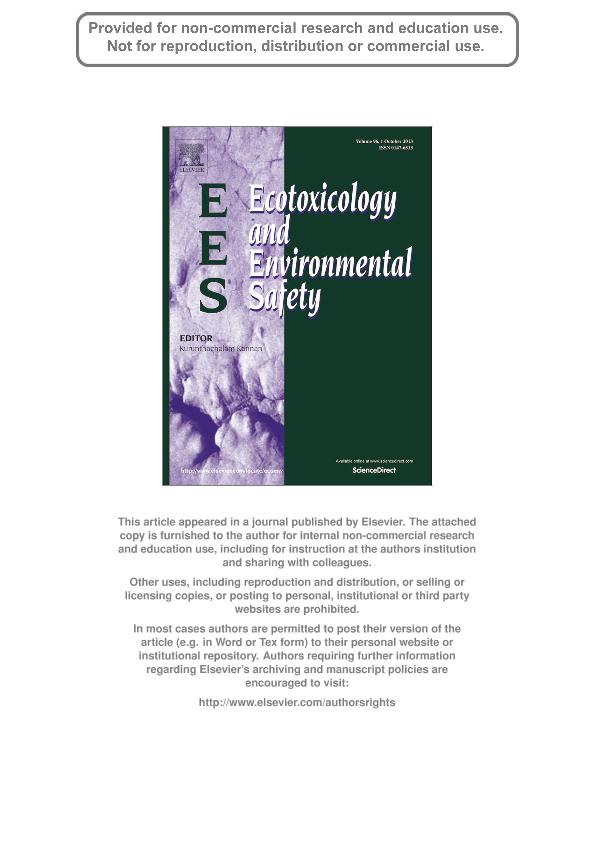Mostrar el registro sencillo del ítem
dc.contributor.author
Di Marzio, Walter Dario

dc.contributor.author
Castaldo, D.
dc.contributor.author
Di Lorenzo, T.
dc.contributor.author
Di Cioccio, A.
dc.contributor.author
Sáenz, María Elena

dc.contributor.author
Galassi, D.
dc.date.available
2017-09-19T16:46:12Z
dc.date.issued
2013-06
dc.identifier.citation
Di Marzio, Walter Dario; Castaldo, D.; Di Lorenzo, T.; Di Cioccio, A.; Sáenz, María Elena; et al.; Developmental endpoints of chronic exposure to suspected endocrine-disrupting chemicals on benthic and hyporheic freshwater copepods; Elsevier; Ecotoxicology and Environmental Safety; 96; 6-2013; 86-92
dc.identifier.issn
0147-6513
dc.identifier.uri
http://hdl.handle.net/11336/24598
dc.description.abstract
The aims of this study were: (i) to assess if carbamate pesticides and ammonium, widely detected in European freshwater bodies, can be considered ecologically relevant endocrine-disrupting chemicals (EDCs) for benthic and interstitial freshwater copepods; and (ii) to evaluate the potential of copepods as sentinels for monitoring ecosystem health. In order to achieve these objectives, four species belonging to the harpacticoid copepod genus Bryocamptus, namely B. (E.) echinatus, B. (R.) zschokkei, B. (R.) pygmaeus and B. (B.) minutus, were subjected to chronic exposures to Aldicarb and ammonium. A significant deviation from the developmental time of unexposed control cultures was observed for all the species in test cultures. Aldicarb caused an increase in generation time over 80% in both B. minutus and B. zschokkei, but less than 35% in B. pygmaeus and B. echinatus. Ammonium increased generation time over 33% in B. minutus, and 14, 12 and 3.5% for B. pygmaeus, B. zschokkei and B. echinatus, respectively. On the basis of these results it can be concluded that chronic exposure to carbamate pesticides and ammonium alters the post-naupliar development of the test-species and propose their potential role as EDCs, leaving open the basis to search what are the mechanism underlying. A prolonged developmental time would probably produce a detrimental effect on population attributes, such as age structure and population size. These deviations from a pristine population condition may be considered suitable biological indicators of ecosystem stress, particularly useful to compare polluted to unpolluted reference sites. Due to their dominance in both benthic and interstitial habitats, and their sensitivity as test organisms, freshwater benthic and hyporheic copepods can fully be used as sentinel species for assessing health condition of aquatic ecosystems as required by world-wide water legislation.
dc.format
application/pdf
dc.language.iso
eng
dc.publisher
Elsevier

dc.rights
info:eu-repo/semantics/openAccess
dc.rights.uri
https://creativecommons.org/licenses/by-nc-nd/2.5/ar/
dc.subject
Copepod
dc.subject
Freshwater Pollution
dc.subject
Developmental Time Endocrine Disruptor
dc.subject
Ammonium
dc.subject
Aldicarb
dc.subject.classification
Oceanografía, Hidrología, Recursos Hídricos

dc.subject.classification
Ciencias de la Tierra y relacionadas con el Medio Ambiente

dc.subject.classification
CIENCIAS NATURALES Y EXACTAS

dc.title
Developmental endpoints of chronic exposure to suspected endocrine-disrupting chemicals on benthic and hyporheic freshwater copepods
dc.type
info:eu-repo/semantics/article
dc.type
info:ar-repo/semantics/artículo
dc.type
info:eu-repo/semantics/publishedVersion
dc.date.updated
2017-09-19T14:25:03Z
dc.journal.volume
96
dc.journal.pagination
86-92
dc.journal.pais
Estados Unidos

dc.journal.ciudad
Nueva York
dc.description.fil
Fil: Di Marzio, Walter Dario. Consejo Nacional de Investigaciones Científicas y Técnicas; Argentina
dc.description.fil
Fil: Castaldo, D.. Universita degli Studi dell'Aquila; Italia
dc.description.fil
Fil: Di Lorenzo, T.. Istituto per lo Studio degli Ecosistemi; Italia
dc.description.fil
Fil: Di Cioccio, A.. Universita degli Studi dell'Aquila; Italia
dc.description.fil
Fil: Sáenz, María Elena. Universidad Nacional de Luján. Departamento de Ciencias Básicas. Programa de Investigación en Ecotoxicología; Argentina. Consejo Nacional de Investigaciones Científicas y Técnicas; Argentina
dc.description.fil
Fil: Galassi, D.. Universita degli Studi dell'Aquila; Italia
dc.journal.title
Ecotoxicology and Environmental Safety

dc.relation.alternativeid
info:eu-repo/semantics/altIdentifier/url/http://www.sciencedirect.com/science/article/pii/S014765131300273X
dc.relation.alternativeid
info:eu-repo/semantics/altIdentifier/doi/http://dx.doi.org/10.1016/j.ecoenv.2013.06.029
Archivos asociados
